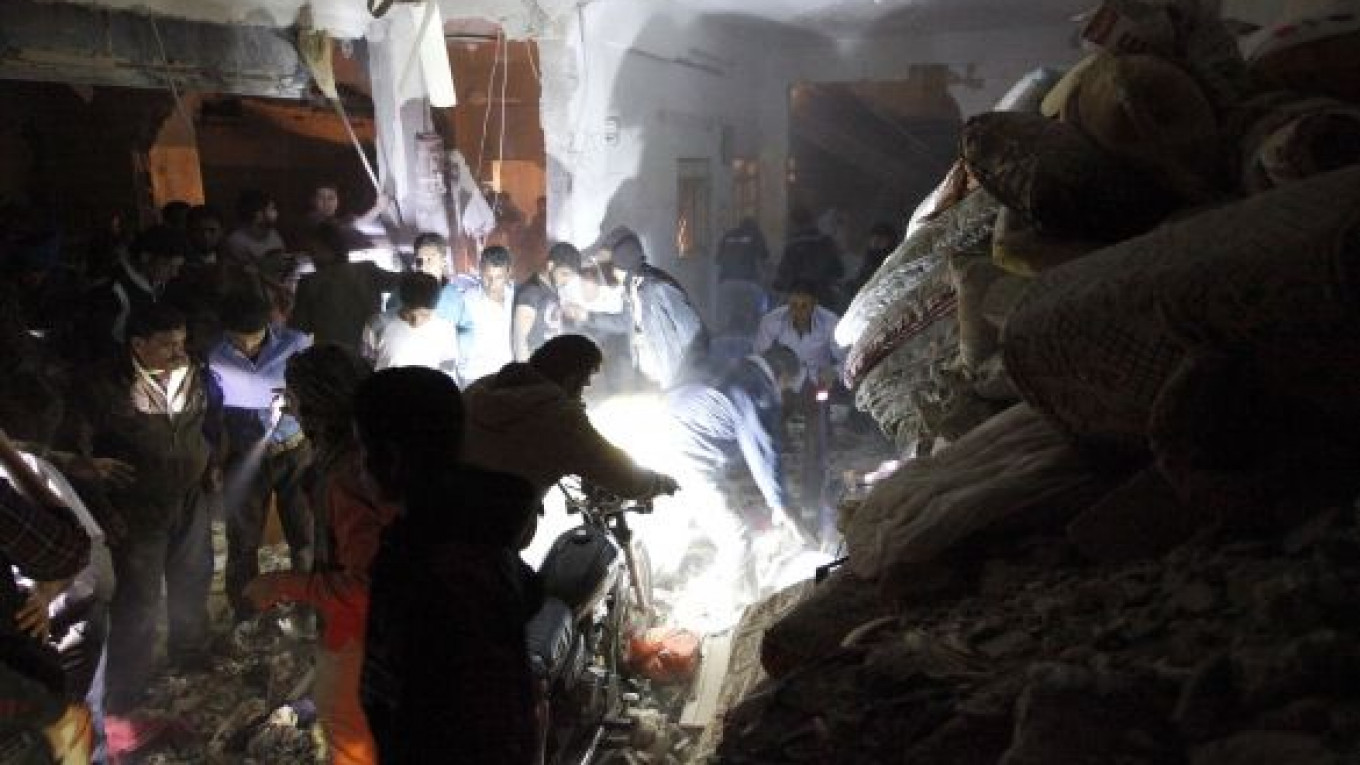DAMASCUS — Syria hopes to clinch more financial aid from its allies Russia and Iran soon, but still has enough foreign reserves to pursue its war on rebels trying to oust President Bashar al-Assad, the central bank governor said.
Speaking at the bank's headquarters, hit by a car bomb on April 8, Adeeb Mayaleh said: "We are expecting much more support from friendly countries … Yes, financial support from Iran and Russia and it could also be from other friendly countries.
"Discussions are going on. We are in the process of putting the final touches on the subject of financial aid in a clear way," he told Reuters in an interview, without specifying how much money Iran and Russia would provide.
He said Tehran had already given Syria a $1 billion credit line, more than half of which had been used, and that Russia was now printing Syrian banknotes, formerly supplied by Germany and Austria until the European Union imposed sanctions on Syria.
The central bank chief, whose office features a large Syrian flag and gold-framed portraits of Bashar al-Assad and his father Hafez, said Syria's foreign reserves were more than sufficient to guarantee essential imports and pay state salaries.
Syria had reserves of $17 billion when the uprising against Assad began just over two years ago. It now had "much more" left than the "incorrect" $4 billion figure which some bankers have quoted, Mayaleh said. He would not give a specific figure.
"If we compare the prices of commodities in Syria to those in neighbouring countries, you find they are cheaper in Syria despite the fact that other countries do not have war being waged on them by countries from around the world," he said.
"This means that reserves are still enough for Syria to stand fast against this conspiracy."
Mayaleh said the war had caused economic losses of "over 25 billion euros" as well as halting growth, which he said had been running at 6-7 percent a year before the fighting began.
Mayaleh criticized the EU for deciding last week to modify sanctions on Syria to allow oil purchases from rebel forces in control of some eastern oil-producing areas.
"I don't understand how the European Union can give these terrorist armed groups the right to export oil from Syria to Europe," he said. "Under what law?...This is money laundering, this is stolen money and these are stolen goods."
"They [Europeans] are nurturing these militant extremists," he said. "When they finish their role in Syria ... they will go to Europe...The Europeans are trying to bring up a monster who will turn against Europe and its citizens."
The Syrian conflict has devastated the economy. Electricity is sporadic and Damascus residents have to queue for long hours for bread or petrol, which often run out. Prices of many basic foods and goods rose between 50 and 80 percent last year.
Mayaleh spoke of how the authorities were coping with the economic challenges posed by a war now entering its third year.
"[The opposition] spread rumors that salaries would not be paid for employees and that the state has gone bankrupt," he said. "Two years have passed in this crisis ... and the salaries have always been paid...a month in advance."
Syria had tackled rumors of forged banknotes in circulation by telling citizens they could exchange any suspect currency at face value in banks for Russian-printed official notes, he said.
Nevertheless, the Syrian pound has slumped to 115 to the dollar in exchange houses from 46 before the uprising.
Mayaleh acknowledged that the pound was weak and that inflation was running at 50 percent a year, but said many other countries in the region, including Lebanon, Iraq and Kuwait, had suffered worse devaluations in times of conflict.
He did not answer a question on whether the government had a specific target for the Syrian pound's value.
Like other government officials here, Mayaleh questioned why the West was "fostering and protecting" Syrian rebels.
"Aren't the Europeans afraid of these groups turning on their countries and turning them into a hell, as happened in America?" he said of al Qaeda's Sept. 11, 2001 attacks.
Downstairs in the central bank building, scaffolding covered walls of an internal courtyard where windows had been blown out by the car bomb. Blinds on the front windows hung twisted. Outside, the blast had shrivelled a palm tree to a black husk.
A crane lifted concrete blocks spray-painted with the Syrian flag into position to protect the building from future bombings.
Related articles:
A Message from The Moscow Times:
Dear readers,
We are facing unprecedented challenges. Russia's Prosecutor General's Office has designated The Moscow Times as an "undesirable" organization, criminalizing our work and putting our staff at risk of prosecution. This follows our earlier unjust labeling as a "foreign agent."
These actions are direct attempts to silence independent journalism in Russia. The authorities claim our work "discredits the decisions of the Russian leadership." We see things differently: we strive to provide accurate, unbiased reporting on Russia.
We, the journalists of The Moscow Times, refuse to be silenced. But to continue our work, we need your help.
Your support, no matter how small, makes a world of difference. If you can, please support us monthly starting from just $2. It's quick to set up, and every contribution makes a significant impact.
By supporting The Moscow Times, you're defending open, independent journalism in the face of repression. Thank you for standing with us.
Remind me later.






